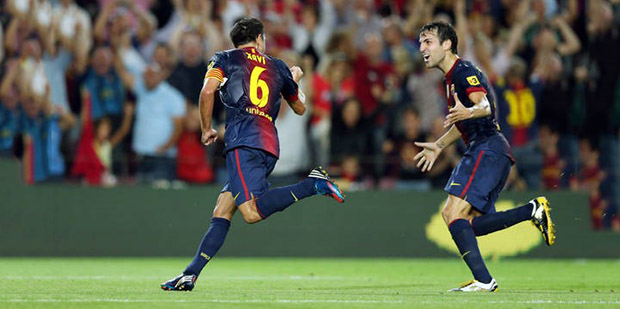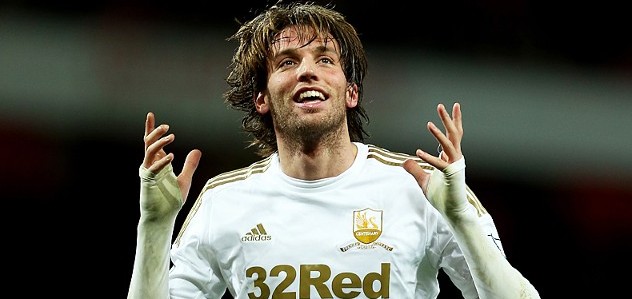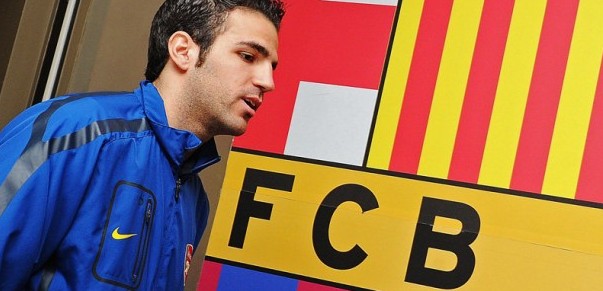- S.D. Eibar ready for maiden La Liga outing
- SD Eibar stengthen ahead of debut La Liga season
- Can ‘Super Mario’ live up to expectations in Madrid?
- MAN IN THE GROUND – Brentford 0 – 4 Osasuna
- Historic Basque derby welcomes S.D. Eibar to La Liga
- Munich to Madrid, via Brazil – Tony Kroos
- Rakitic in Spanish Switch
- Can Spain find redemption in Rio?
- Viva Espana! A season of redemption for Spanish football
- From the old to the new: who can fill the void in years to come for La Roja?
SPAIN AND THE FIVE P’s – Special Feature
- Updated: 31 August, 2011
I am delighted to bring you our first article in the Guest Feature area of elcentrocampista.com.
This new and exciting feature will offer the very best articles published each month on Spanish football websites around the globe, and will be an ideal opportunity to add something new to our excellent content already written daily by the team.
Today we have a fantastic read looking at the secret to Spain’s footballing success.
The article was published on 4 August by our friends over at spanishfootball.info and is written by the site’s founder and editor, Jamie McGregor.
I would like to thank Jamie personally for contributing the excellent piece of work, as I am a huge fan of spanishfootball.info and the fantastic content they produce.
I hope you enjoy the read and make sure you visit www.spanishfootball.info for more.
¡Gracias!
Iain
By Jamie McGregor
This week Spain added the European Under 19 Championships to their impressive list of titles which already includes the European Under 21 and senior championships as well as the World Cup.
It was the eighth time Spain had won Europe’s premier Under 19 tournament, putting them just one victory behind nine time winners England. Of course you can do a lot with statistics and what is rather telling is that whilst England’s last triumph in the tournament came in 1993, five of Spain’s eight have come since 2002. That is to say, Spain is clearly the dominant nation on the continent at the moment.
There’s an expression in the business world; Proper Planning Prevents Poor Performance, known simply as the five Ps. What this expression encapsulates is a simple but fundamental principle. In football, Spain are living by their own set of five Ps. Like the original ones, they are simple and based on common sense. Whether it’s at under 19 or senior level, Spain’s performances may appear spectacular and complicated but when you look closely, like all great things it’s based on perfection of the basics. If you were to ask any Spanish coach the key to their success, he would most likely tell you the following five Ps.
-
Passing
The first P is for arguably the most basic skill in football, passing. Every player who pulls on the red and yellow of Spain, including the goalkeeper, must be able to and be comfortable with passing the ball. In Spain, passing is fundamental to every part of the game from getting yourself out of trouble to taking advantage of opposition mistakes. Its use in defending is equally as important as its use in attacking.
During the recent European Under 21 Championships, some sections of the British media criticised Spain’s team for overpassing and not being direct enough. In Spain that criticism fell on deaf ears. Of course the fact that Spain didn’t kill off England in the opening game despite overwhelming possession was highlighted but the idea that they should abandon their style of play was never considered.
The reason for their insistence on passing is not for aesthetic one, although it is pleasing on the eye. In fact it’s rooted in rationality. That all moves should start at the back with the goalkeeper rolling the ball to one of his defenders who in turn feeds a midfielder is not up for debate. After all, the alternative (a kick from the goalkeeper to the half-way line) brings only a 50/50 chance of winning the ball, which is frankly nonsensical.
A lot is made of Spain’s midfielders and how well they pass the ball but if you really want to see the difference between Spain and most other countries look at their defenders and compare how they pass the ball. Not only are they the last line of defense but the first line of attack.
-
Possession
One of the advantages of having a whole team of players who can pass the ball is the ability to maintain possession. I cannot remember the last time I watched a Spain game at any level and they didn’t dominate possession. Again, some people argue that having so much possession is pointless if you don’t score goals and it’s certainly true that at times Spain have failed to kill off matches but as their trophy cabinet shows, 9 times out of 10 it works.
Once more the reason for having possession is rational rather than aesthetic. The logic is simple, if you have the ball the opposition can’t score. What’s more, having so much of the ball saves energy while at the same time draining your opponent’s. Chasing the ball for long periods of the match, as many of Spain’s opponents must do, is tiring both physically and mentality. It takes exceptional concentration and discipline not to make a rash tackle and give away a free-kick or move out of position and leave a space. Some teams, such as José Mourinho’s Inter Milan, are able to do it but most aren’t. Sooner or later the lack of the ball grinds them down and when you have players such as Sarabia (U19), Thiago (U21) or Iniesta (senior), mistakes rarely go unpunished. Some people say attack is the best form of defense, for Spain possession is the best form of defense..
-
Pressing
Of course no team ever has 100% possession and therefore it’s as important what you do when you don’t have the ball as when you do have it. Winning the ball back quickly and giving your opponent no time to settle is tactic employed by all Spanish teams. It’s achieved by pressing their opponents all over the park. Pressing happens anywhere the opposition come into possession but it’s particularly effective close to their goal. This is where the Spanish strikers play their role, chasing down defenders, winning throw-ins, corners and free-kicks around the penalty area. A top class player can make good decisions quickly but most players can’t, they panic and make poor choices. The energy Spain’s opponents have used trying to win the ball means they are more tired when they get it and are easier to rush into mistakes.
-
Patience
They say patience is a virtue and there’s no better example of that than the Spanish national team. Not every match goes their way and there are teams out there whose organisation and discipline can frustrate the Spanish style. However, what you will never see is a Spanish team panicking and resorting to long, hopeful balls. It’s vital to remain calm and think every move through. Some days, like against Switzerland in the opening game of the World Cup, Spain are simply unable to break down an opponent. Losing is part of the game and it happens to every team. If it’s happening all the time, you need to change but when it happens so infrequently you stick to your principles. In Monday’s Under 19 final against the Czech Republic Spain found themselves behind twice despite dominating possession. However at no point did the players or manager panic, they continued passing and controlling possession, waiting for a mistake to exploit. Had they started hitting hopeful shots and crosses, the Czechs may well have hung on to win but as it happened they simply couldn’t live with the Spanish movement and passing and La Rojitapicked up another trophy.
-
Passion
We’ve spoken about technical and psychological aspects of the Spanish game but one thing all great teams need is passion and Spain have it in abundance.While players in certain other countries see playing for the national team as a burden, Spanish players genuinely consider it an honour. No matter who, where, why and when Spain are playing call offs are extremely rare. While England’s big stars pulled out of the Under 21 Championships this summer, Spain sent a full strength team. All tournaments at every level are taken extremely seriously. Players must learn a winning mentality. They must learn how a tournament works both on and off the field. The same is true for friendlies, which are seen as vital parts of the preparation for competitive matches. This approach to youth and senior football is only possible because of the passion and cooperation of the players who at no point try to undermine the efforts or importance of the national team.
So there you have it, the five Ps of the Spanish national team. Of course there could have been more, power, pace, precision and ultimately perfection.
Follow @icentrocampista






You must be logged in to post a comment Login